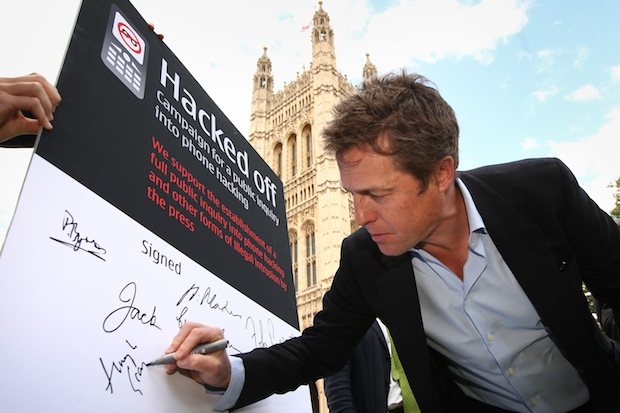It is a peculiar alliance, when you think of it, which wishes to bring to an end 300 years of press freedom in this country. The handsome actor Hugh Grant would rather the press didn’t find out about him being ‘noshed’, as I believe the term has it, by a prostitute on some Los Angeles freeway. I can understand that, even if I do not think he has the right to make that call, given the image he adopts to sell himself to the public. The absolutist metro liberal left, meanwhile, would have no doubt -whatsoever who was the victim in that particular scenario: the nosher, not the noshee. Grant should be prosecuted and outed; the, uh, sex–worker, meanwhile, is a victim, oppressed by very real economic and gender (and in the case of Hugh’s illicit young lady) racial imbalances intrinsic to the capitalist system.
This hysterical and intolerant arm of the modern left does not have much time for celebrity, or for wealth, or indeed for privacy as a general concept, although it believes very strongly in its own privacy, as we saw with the case of one of its most cherished scions, Julian Assange. If we’re honest, it doesn’t really have much time for sex, per se; that is simply another means by which powerful men suppress and exploit vulnerable women, and all forms of contact between the two sexes should therefore be rigorously policed, with strict regulations as to how and when and where one might make an advance to a woman, with transgressors punished — in the press, for example (in the case of Lord Rennard), and better still in the courts.
For his part, I don’t suppose Mr Grant signs up to the full panoply of institutionalised intolerance and paranoia which is the manifesto of the liberal left. I always suspected Grant was apolitical verging on wettish Tory — the very sort of person his erstwhile allies most despise. But that’s Hacked Off for you; on the one hand a bunch of slebs who simply wish to stop you knowing how many kilos of gak they shove up their nostrils each evening or how many times they have cheated on their wives or the precise details of their exciting liaison with a professional nosher. And on the other, a tiny but highly voluble minority of the British public who believe that saying stuff with which they fervently disagree should actually be made illegal. The Guardian and its pitiful handful of readers, the middle-class lefties at the BBC, what remains of the Independent, an unlovable tranche of Labour and Liberal Democrat MPs, and the few thousand -desolate souls who seem to spend their entire lives screeching hatred at people who’ve offended them on the internet, who wish everyone but themselves to be silenced.
Still, it looks very much as though this coalition of antitheses will win the day and henceforth politicians will decide exactly what newspapers can and cannot say. It is not the slebs who have won, they have been duped; it is the metro-left — because whatever happens, actors and pop stars will still have their bad behaviour reported, somehow or other, by the press.
As we have seen recently, what the left wishes to silence are political opinions which differ from its own. That is where the lawyers will have their field day, that is where the journos will find themselves fined, or hauled before the courts and possibly imprisoned. That is where Lord Leveson, with his palpable contempt for the press and — when the facts were presented to him — utter indifference to the much worse behaviour of other professions, most notably lawyers, has left us. I say these people are a tiny minority — and they are: a recent opinion poll suggested that 67 per cent of the public did not wish politicians to have any involvement in regulating what the press can and cannot do — but I suppose they are the new establishment. They have power, that is for sure.
We saw what Leveson and state regulation of newspapers will do in the Miliband/Daily Mail affair; a non-story or maybe at best a half-story which nonetheless was dragged out, by the BBC in particular, but also by the Guardian and the Labour party, for two whole weeks — and still has not gone away.
I have no objection to Ed Miliband taking offence at what was said about his father in the Daily Mail; he was at least partially right to cavil at the headline which accompanied the original, somewhat crudely cobbled-together piece of writing. But his subsequent confected outrage and statements that the ‘culture’ of the Daily Mail needed investigation and must be put right were of course a calculated genuflection to Hacked Off. No such furore would have been occasioned by a sleb angry that his privacy had been invaded; the BBC, for one, would have lost interest within hours.
But not when Geoffrey Levy attacked Ralph Miliband; implicit in the coverage from our state broadcaster and in the comments from Miliband and — as Michael Gove helpfully put it — that blob of furious opinion, is that such views simply should not be allowed. Not simply that they are ‘wrong’, but that there should be laws which stop them being written in the first place. I wonder if Hugh Grant is entirely comfortable with that?







Comments